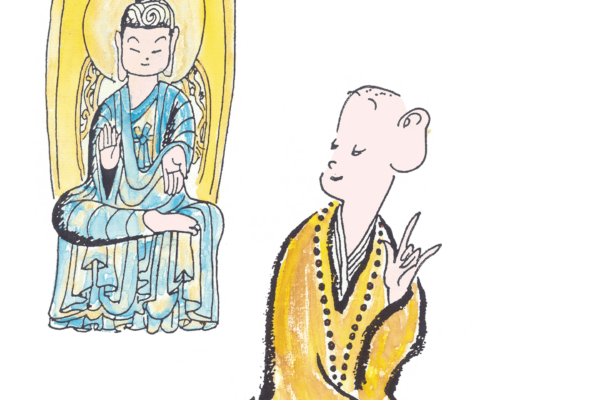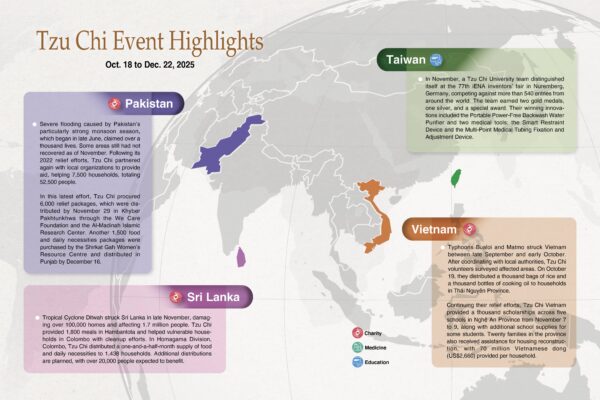By Gao Zhao-liang
Translated by Wu Hsiao-ting
Photos by Zhan Da-wei
After he was released from prison, he became a volunteer to make amends for the wrongs he did to society. His conscience, however, couldn’t rest until he had obtained forgiveness from the person he had victimized.
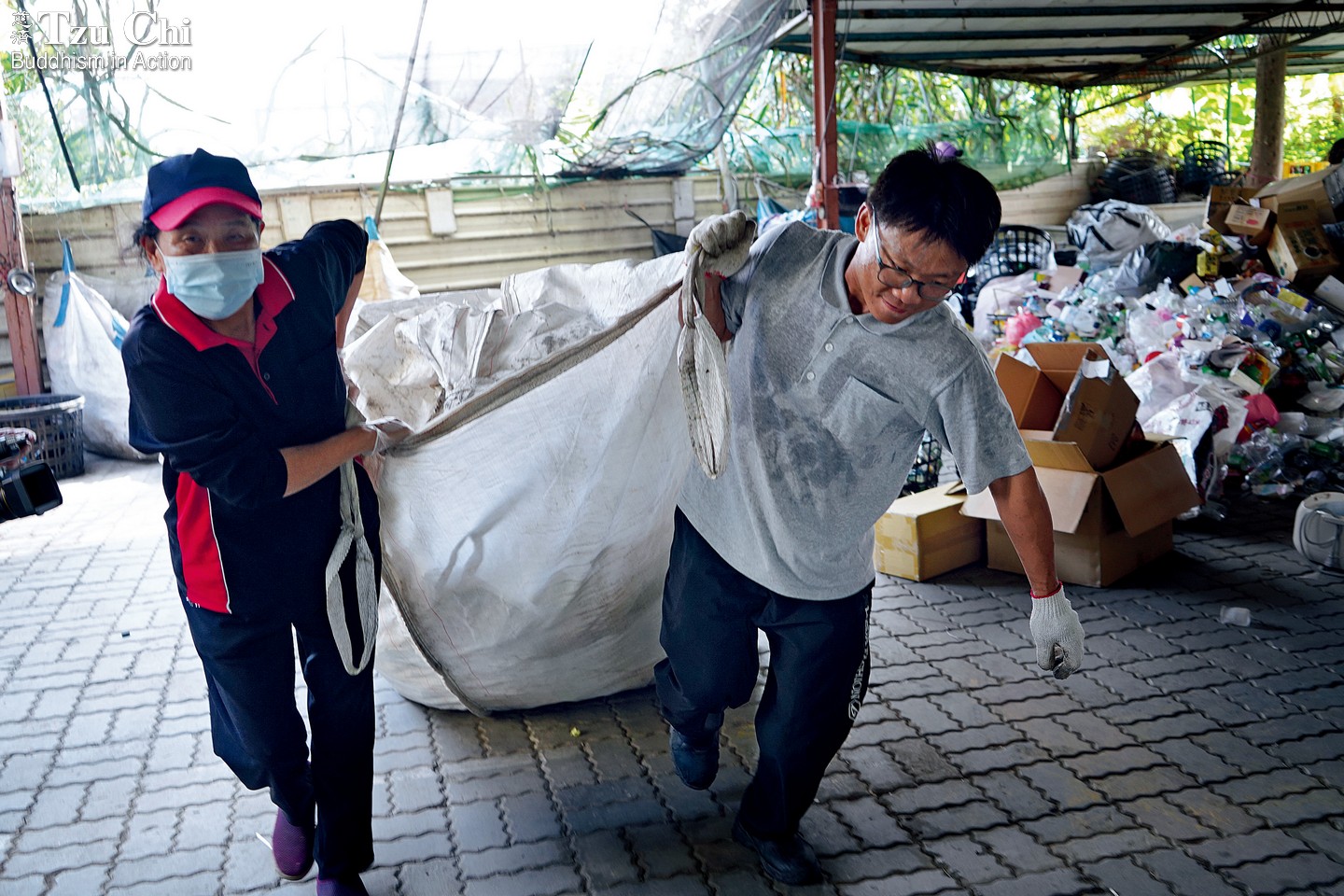
Yang Zhi-wei (right) volunteers in a Tzu Chi recycling station. A reformed former inmate, he feels that he is gaining a new lease on life like the garbage he helps to recycle.
Though it was just after four in the morning, before dawn had even broken, Yang Zhi-wei (楊志偉) was already up, getting ready for the day. He lives in central Taiwan, in the township of Puxin, Changhua County. After chanting the Earth Treasury Sutra, he quickly donned a thick jacket—it was a chilly morning—and hurried to an animal farm, where he loaded some bottles of warm goat milk onto his motor scooter for delivery. It would take more than two hours to make the rounds of all his households. When he was done, he had another job waiting for him.
I first met Yang two years ago, just after he’d been released from Hualien Prison, in eastern Taiwan. Gao Wei Ying (高惟碤), a fellow Tzu Chi volunteer, accompanied Yang back to his home in Puxin, Changhua County, and then brought him to visit me at my home in Yongjing, Changhua County.
Sporting a crew cut, Yang impressed me as a man of few words. He quietly listened to me tell him about the recycling activities and monthly study groups in which he could participate. “It’s good to volunteer,” I advised him. “But first and foremost, you need to find a job and do your best at it.” He nodded at my words and, pressing his palms together, thanked me for my advice.
Yang was born in 1982, the second oldest child in his family, and the only boy. He grew up in an affluent environment, but became rebellious when he entered junior high. He smoked, cut classes, and he even began doing drugs after entering senior high. He took to robbery to get money to pay for his drug use, and he was arrested. He ended up in a youth rehabilitation center at 16, which interrupted his high school education. He was released from the correction facility three years later, when he was 19, just in time to begin his compulsory military service. He served on Kinmen, one of Taiwan’s offshore islands.
He returned to Taiwan after his stint in the military, ready to start a new phase in his life. Who was to know that it was just the beginning of another dark period?
He soon landed a job maintaining electrical equipment at a hotel, making a regular income of about 30,000 Taiwanese dollars (US$990) a month. This should have been enough to support himself, but he took to gambling and visiting red-light establishments in his free time. With this lifestyle, he became unable to make ends meet. “At a casino, I could easily win 60,000 Taiwanese dollars a night,” Yang recalled. “Once I tasted what it was like to make money so easily, all I could think about was how to make quick money.” As a result, he quit his job at the hotel and began dealing in scrap metal.
To outside observers, he was a legal recycling merchant, but in actuality he was buying and selling stolen goods. When business was good, he could rake in upwards of 200,000 Taiwanese dollars (US$6,600) a month. The “good days” didn’t last long though. The police caught wind of what he was doing and began working on leads to arrest him. He had, by that time, run up some debt as a result of his gambling habit. To repay his debt, he borrowed money from loan sharks. He was eventually driven to the end of his tether and committed another robbery at age 26. He was caught and was given a heavy prison sentence of 16 years.
His father’s passing
Barely two years into his sentence, he received bad news from his family. His father, who had always showered him with love, had passed away from esophageal cancer. Before he died, he told Yang’s mother not to let their son attend his funeral. He made that request because he knew that if Yang attended, he would have to do so in shackles, and he worried that the looks from their relatives would hurt his son’s dignity. Yang broke down in tears when he heard that. He thought about how he had never had his father’s good at heart or done anything for him, and yet on his deathbed his father was still thinking and worrying about him.
Overwhelmed by grief and the knowledge that he’d never be able to show his love for his father, he was filled with deep remorse for all the bad things he had done and for the sadness he must have caused his parents. A resolution formed in his heart to mend his ways and turn over a new leaf. He decided to finish his high school education to repay his father’s love for him. For that purpose, he enrolled in the high school affiliated with Hualien Prison.
In the year he was about to graduate, a series of gas explosions triggered by underground gas leaks occurred in Kaohsiung, southern Taiwan. During their regular visits to Hualien Prison, Gao Wei Ying and other Tzu Chi volunteers encouraged inmates there to donate to help explosion victims. They said that no matter how much the inmates donated—even if it was just one Taiwanese dollar (US$0.03)—it was a show of love. Yang donated a five-dollar postage stamp. When he received the receipt for his donation, he found that a Tzu Chi volunteer had donated 95 dollars (US$3.15) in his name and round up his donation to 100 dollars.
“Everything the volunteers do is to benefit society,” Yang pondered. “I, on the other hand, have done nothing but harm to others.” He began to hope that he could join Tzu Chi after he got out of prison. That was why volunteer Gao accompanied him to my home when he was let out on parole in 2017. Since Yang’s hometown is in Changhua County, just as mine is, and I, like him, am a former inmate, he was assigned to my care.
Less than a month later, while Yang was still transitioning back to society, he fell from a high place at work and broke his arm. The accident greatly depressed him. I tried to cheer him up and give him a lot of encouragement. His arm needed three months to recover. I tided him over that time financially and drove him around every day to take part in volunteer activities. At my encouragement, he signed up for volunteer training too.
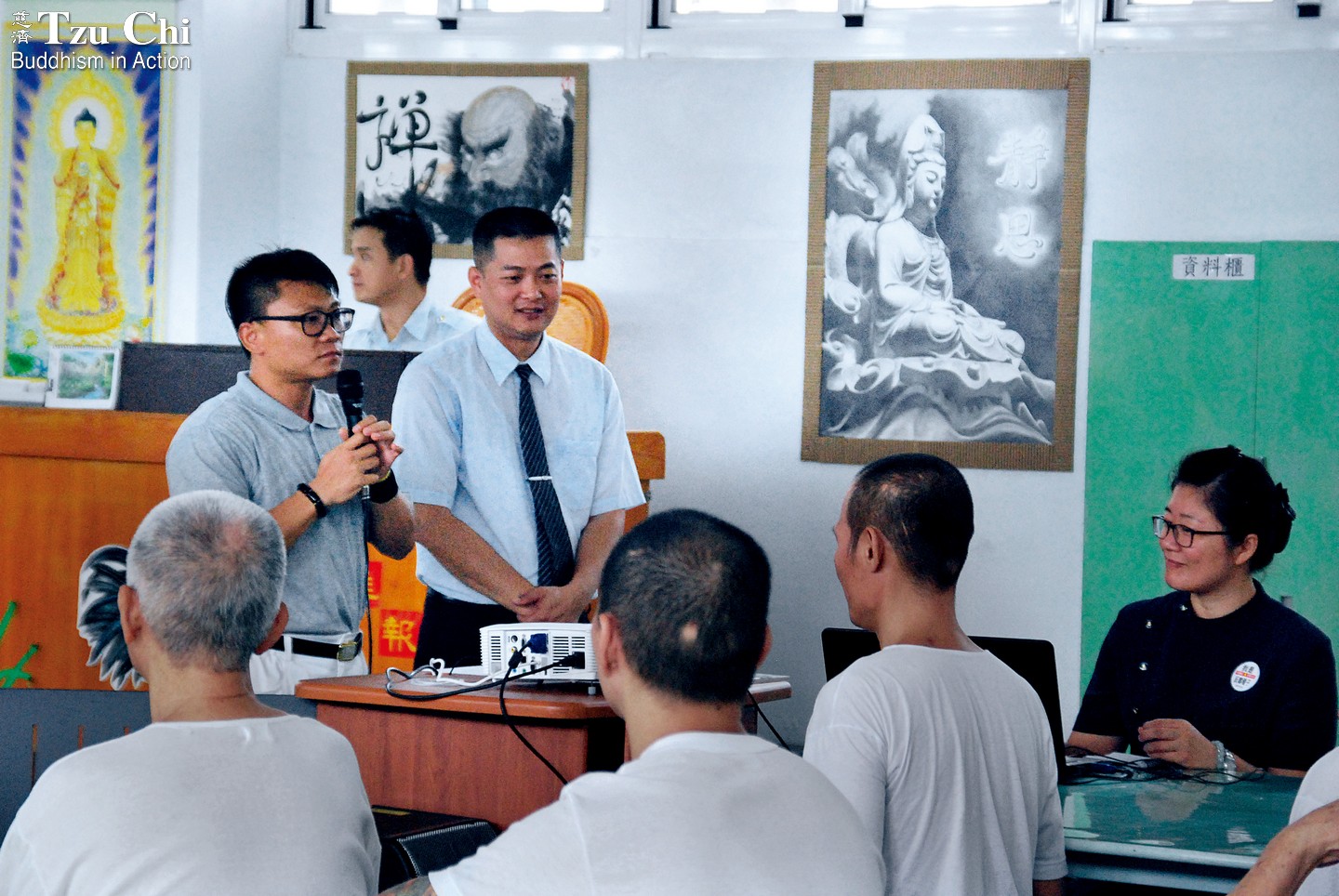
Yang Zhi-wei (holding microphone) and Gao Zhao-liang (高肇良), the author of this article, share their personal stories in a prison. Their presentation helps inmates realize that it is never too late to mend their ways. WENG HUA-LING
For 70,000 dollars
When Yang’s arm was healed and he resumed working, I noticed how hard he was working to make money. He’d leave home after four in the morning to deliver goat milk. Then, at seven-thirty, he’d arrive at an ironworks to do hourly work. If there was no work for him at the factory, he drove a truck to collect recyclable materials for a recycling dealer. Seeing how driven he was, I asked him one day out of curiosity why he was working so hard to make money. I asked if he was in financial straits and needed help.
His face took on a solemn expression as he answered my questions. He said that ten years before, he had taken 77,000 Taiwanese dollars (US$2,550) from someone in a robbery. Though he had served his sentence for that crime, he couldn’t forget the terrified, despairing look on the victim’s face. He often thought of what happened that day, and he was full of remorse. After joining Tzu Chi, he came to a deeper realization of the karmic law of cause and effect. “I want to apologize directly to the victim and return the money I took from her,” he said. “I should be able to save 100,000 Taiwanese dollars [US$3,300] by delivering goat milk for a year.”
I was moved beyond words when I heard what he said. He had been in Tzu Chi for just a short time, and he was still struggling to get back on his feet economically. Yet he was already showing himself to be deeply repentant, and he was working hard to redress his mistakes. With time, I also noticed how he was demonstrating a real enthusiasm in his volunteer work. My faith in him grew stronger and stronger.
Please forgive me
More than a year later, Yang had finally scraped together enough money to return what he “owed” to the victim. I contacted an officer I knew, Cai Xin-hua (蔡欣樺), director of the Probation Officers Office at the Changhua District Prosecutors Office, and asked for her help. She assigned probation officer Sun Qi-jun (孫啟俊) to handle this case. Sun went through the files from years ago and was finally able to contact the victim, Ms. Cai. He informed her of the situation and asked if she’d be willing to meet with Yang. She agreed, and so a restorative justice meeting was set up.
Yang and Cai met on November 28, 2019, in a conference room at the Changhua District Prosecutors Office. The Office had assigned a teacher from the Changhua University of Education to serve as a neutral third-party facilitator. The atmosphere in the room was solemn and awkward in the beginning, but the facilitator soon helped break the ice between Cai and Yang. They had a very positive interaction from there on out.
Looking at Cai, Yang said in tears, “Hurting you is the most regrettable thing I’ve ever done in my life. Though I’ve served my rightful sentence, I can never forget the wrong I did to you. I’ve been wanting to apologize to you in person for a long time, but I haven’t had the chance until now.
“My dad passed away while I was serving my prison term. It shook me awake and brought me to my senses. It taught me the importance of practicing repentance and gratitude and set me on a path to change myself for the better. I finished my high school education while in prison, and I’ve been volunteering for Tzu Chi since my release to make up for the wrongs I did to society. I now work at a factory and live a stable life. Ms. Cai, I’m very sorry. Will you forgive me?”
Cai burst into tears upon hearing Yang’s apology and his request for forgiveness. She said to him, “The fact that you are now able to return the money to me shows that you must be doing okay financially and are no longer a burden to society. I’m very happy to see you doing well. Keep going and keep up the good work. I forgive you.”
Never too late
Yang actively participates in volunteer activities in his free time. He does recycling work, helps clean up the local Tzu Chi office, and attends study groups. He also visits prisons to extend care to inmates. At the end of 2019, he completed his volunteer training and received his certification from Master Cheng Yen.
The Master says that repentance leads to the purification of the heart. Yang keeps these words firmly in his mind. He thanks all those people who have helped him along the way. “I used to be a selfish person who thought only of myself,” he said. “I never gave to others, but only received. I’ve participated in a lot of volunteer work these past two years, and through that I’ve learned how wonderful it is to live a full life of purpose. My life now is as different from my life in the past as heaven is different from hell.” He has seen how sincere repentance can lead to the healing of wounds. He pledges to stick to the path of doing good and to make the best use of the life given to him by his parents.
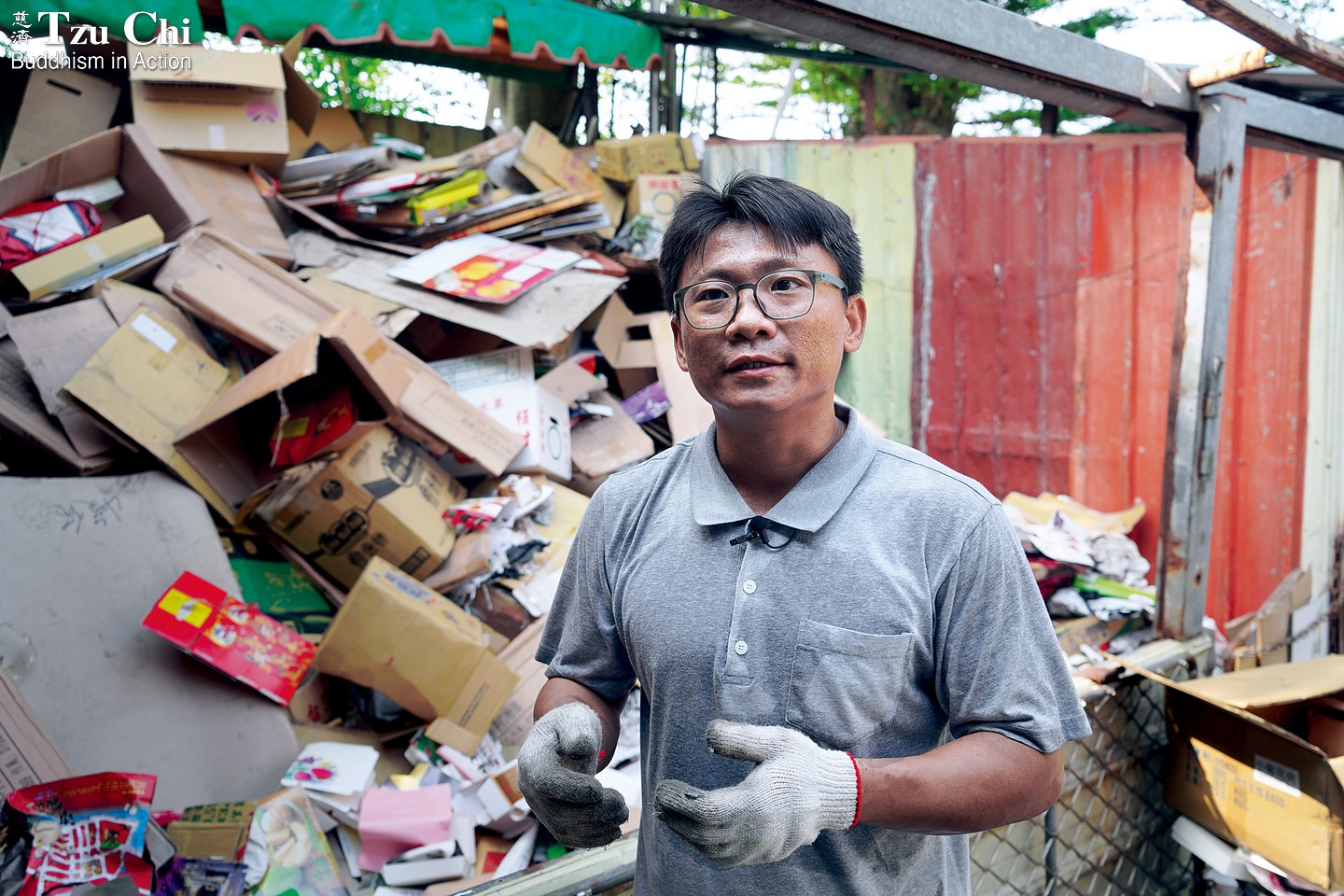
Yang does many odd jobs to make a living. In his free time, he dedicates himself to volunteering. His life now is filled with a sense of purpose and fulfillment.

